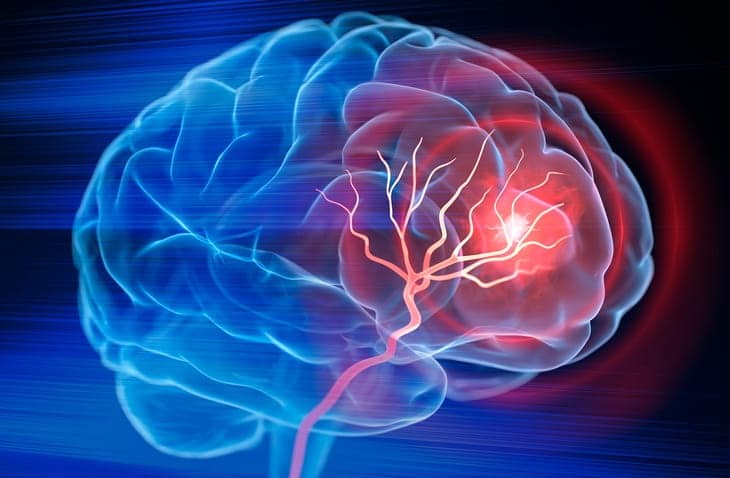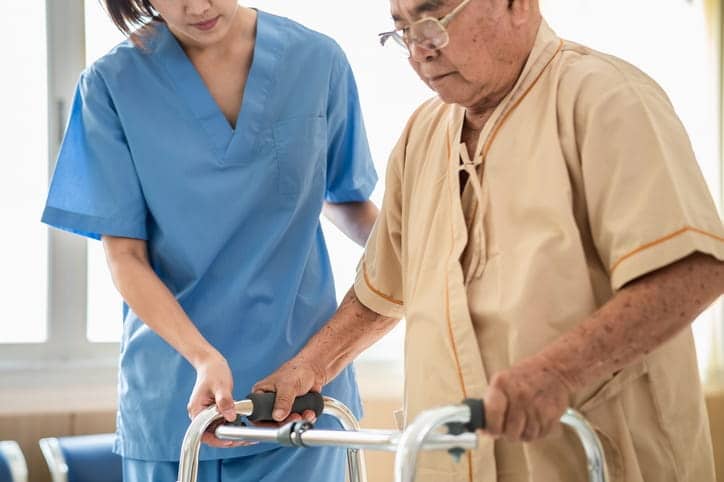iscStrokes are the fourth leading cause of death in the U.S., with older populations being impacted the highest. The latest data indicates that 75% of strokes occur in individuals aged 65 and older.

If you have an elderly loved one who has suffered a stroke, it’s important to know how to help them afterward so they can have the best recovery possible.
For some families, turning to the support of a senior care facility might be the best option. Haven Heath is a proud operator of assisted living facilities throughout Arizona and is committed to serving families who need support with their elderly loved ones, especially during their recovery following a stroke.
To learn more about the services our facilities can provide, contact the team at Haven Health today.
What is an elderly stroke?
Strokes are medical emergencies that are complex in nature and require dedicated care after a victim experiences one. In elderly stroke victims, the recovery process is especially important because the older a victim, the harder the recovery process can be.
Strokes, also known as brain attacks, are when an individual’s brain suffers damage because of a lack of blood supply to the brain. This lack of blood supply can occur in one of two ways: a ruptured artery or a blocked artery.
A ruptured artery results in a blood vessel in the brain bursting, causing parts of the brain to become damaged or die. A blocked artery can have the same effect but occurs when something like a blood clot keeps blood from moving to the brain.
According to the Stroke Association, Ischaemic stroke, or a blockage of the blood supply to the brain, is the most common elderly stroke reason.
How can I help my elderly loved one after a stroke?
Whatever the age of a stroke victim, it’s important to seek medical attention and have a detailed recovery plan in place. All victims will have a different rehab plan and will experience a different path to recovery because strokes can have varying outcomes.
Elderly stroke victims should be provided with dedicated care following their stroke to ensure the best recovery possible.
The first few days and weeks after an elderly victim’s stroke are critical. This is the time when they need the most care and attention. Medical professionals will also keep a close eye on elderly stroke victims to assess the full extent of the damage.
In the first few days after a stroke, your elderly loved one should get as much rest as possible so their body can begin recovering. Typically, elderly victims can expect to spend anywhere from 5 to 7 days in a hospital after they’ve experienced a stroke. Depending on the type of stroke they’ve had, the severity of the stroke, and their condition, this hospital stay may be extended.
In the early days, the best way to help your elderly loved one is by ensuring they get enough rest and follow their treatment plan. This may look like assisting them to get dressed, eat, bathe, help them take their medication, and even move around.
Some individuals may need to provide additional support, including physical and speech therapy. The level of care you need to provide your loved one depends on the extent of their injury.
How long does it take for an elderly person to recover from a stroke?
Elderly stroke victims aged 65 and older can have varying recovery times. Typically, however, the older an individual is and the more severe their stroke, the longer the recovery process will be.
With these factors in mind, it can take an elderly stroke victim anywhere from six to 12 months to see a full recovery. It’s also important to remember that having a solid rehabilitation plan in place, following that plan, and having access to a medical support system can all influence overall recovery time.
How long does it take a 70-year-old to recover from a stroke?
An average 70-year-old who has suffered a stroke can expect anywhere from six to 12 months to recover from their stroke. Even then, there may be additional symptoms that linger and will require a stroke victim to adapt to them. Because this is an older age to have a stroke, it is not entirely unusual to have a longer recovery time. Patience, persistence, and sticking to a recovery plan are key to a successful recovery from strokes in older people.
Be aware of recovery setbacks
It’s also important to keep in mind that although a stroke victim’s recovery will progress in the right direction, loved ones and caretakers should expect setbacks along the way. Some setbacks include health issues like pneumonia, mental and emotional difficulties during recovery, and even the possibility of a heart attack or a second stroke.
While these setbacks can impact an individual’s recovery, this does not mean their path to recovery won’t continue. Working closely with a caretaker and the rehabilitation team can ensure that any setbacks that do arise are handled accordingly so the elderly stroke victim’s health can continue to progress.
What helps stroke patients recover faster?
A stroke victim may suffer a brain injury that requires the brain to create new neural pathways to regain physical and emotional functions that were lost because of the stroke. Ensuring your elderly loved one receives consistent medical care is the best way to keep their brain and body engaged to encourage critical brain healing. Tactics that can help with faster recovery include:
- Avoid overdoing physical activity, as this could lead to exhaustion and even additional injuries
- Avoid overdoing mental activity and allow your elderly loved one to have brain breaks when they feel overwhelmed or overstimulated
- Following a healthy diet allows the body and brain to get the nutrients it needs. For older adults, it’s best to incorporate foods high in omega-3 fatty acids and avoid a processed diet.
- Elderly stroke victims should get plenty of rest
- Work with a skilled nursing facility that can offer individualized, round-the-clock care
Can a senior care facility help with stroke recovery for elderly victims?
An assisted living facility such as a senior care facility can play a critical role in helping an elderly stroke victim recover. These types of facilities offer specialized care and rehabilitation services that an elderly stroke victim needs.
In addition to offering critical around-the-clock medical care, a senior care facility can provide elderly stroke victims access to trained professionals, physical therapists, occupational therapists, speech therapists, nurses, and other medical professionals who can aid in the recovery process.
Additionally, a senior care facility offers a supportive and structured environment from which your loved one can benefit greatly. The loved ones of an elderly stroke victim can also find these services beneficial as a senior care facility can provide mental and emotional support for individuals behind the elderly victim who was impacted.
Related: The Role of Occupational Therapy in Assisted Living
Find a senior care facility near me

If you want to learn more about elderly stroke help from an ‘assisted living facility near me,’ turn to the professional and friendly team at Haven Health. Let our dedicated team help your family find a skilled nursing facility to support your loved one. Our team has helped families just like yours find elderly stroke victims the help they need during their time of need.
Contact us today to see how our team can offer elderly stroke help and resources.
Sources:
Ischaemic Stroke. (2023).
Lui, S., et al. (2018). Elderly Stroke Rehabilitation: Overcoming the Complications and Its Associated Challenges.